
Bahrain
| Continent | Asia |
| Capital | Manama |
| Population | 1,378,904 |
| GDP | $66.37 Billion |
| GDP per Capita | $50,300 |
| Dialing Code | +973 |
| ISO Code (2-letter) | BH |
| ISO Code (3-letter) | BHR |
Bahrain Landscapes






About Bahrain
Welcome to Bahrain, an archipelago of 33 islands nestled in the heart of the Arabian Gulf. This modern nation of approximately 1.5 million people combines ancient heritage with contemporary sophistication across its 765 square kilometers. The name “Bahrain” means “two seas” in Arabic, referring to the fresh water springs that bubble up beneath the salt water of the Gulf, a phenomenon that helped create the nation’s ancient pearl diving industry.
Geographic Features and Natural Beauty
Bahrain’s geography is unique among Gulf nations, comprising both natural and artificial islands. The main island, which contains the capital Manama, features a gentle terrain with a low central plateau. Despite its desert climate, Bahrain is known for its abundant sweet water springs, which have sustained life on the islands for thousands of years.
The Tree of Life, a 400-year-old mesquite tree that survives in the middle of the desert without any apparent water source, stands as a natural wonder and symbol of resilience. The nation’s coastline stretches over 161 kilometers, featuring beautiful beaches, mangrove forests, and diverse marine life.
Artificial islands and reclaimed land have significantly expanded Bahrain’s territory, with projects like the Durrat Al Bahrain and Amwaj Islands showcasing innovative architectural and engineering achievements.
Cultural Heritage and Traditions
Bahraini culture reflects its position as an ancient crossroads of trade and civilization. The country’s pearl diving heritage remains an important part of its cultural identity, though the industry has given way to modern economic activities. Traditional crafts such as pottery, weaving, and boat building continue to be practiced and celebrated.
The nation’s cultural scene is vibrant and diverse, with the Bahrain National Theatre and the Bahrain National Museum showcasing both traditional arts and contemporary expressions. The annual Spring of Culture festival brings international performers while celebrating local traditions.
Bahraini cuisine combines Gulf, Persian, and Indian influences, featuring dishes like machboos (spiced rice with meat) and muhammar (sweet rice with dates). The traditional coffee ceremony remains an important aspect of Bahraini hospitality.
Historical Journey
Bahrain’s history stretches back over 5,000 years, with the ancient civilization of Dilmun making it one of the oldest continuously inhabited places in the world. The Dilmun burial mounds, numbering over 350,000, stand as testament to this ancient heritage and are now a UNESCO World Heritage site.
Through the centuries, Bahrain has been ruled by various powers, including the Assyrians, Babylonians, Persians, Portuguese, and Omanis. The Al Khalifa family has ruled since 1783, and under their leadership, Bahrain became the first Gulf state to discover and exploit its oil resources in 1932.
The country gained independence from British protection in 1971 and has since developed into a modern constitutional monarchy, implementing significant political reforms in the early 2000s.
Modern Economic Landscape
Today’s Bahrain has successfully diversified its economy beyond oil, becoming a major financial center in the Middle East. The country’s liberal business environment, advanced infrastructure, and strategic location have attracted international banks and financial institutions.
The Bahrain Financial Harbour and the Bahrain World Trade Center symbolize the nation’s economic transformation. Tourism plays an increasingly important role, with the Formula One Bahrain Grand Prix bringing international attention and visitors.
The country has invested heavily in education and training, establishing itself as a regional center for Islamic banking and finance, while also developing its manufacturing and services sectors.
International Relations and Global Position
Bahrain maintains strong international relationships, particularly with other Gulf Cooperation Council (GCC) countries and Western nations. The country hosts the United States Navy’s Fifth Fleet and has been designated as a Major Non-NATO Ally of the United States.
Did You Know?
• Bahrain was the first Gulf state to discover oil in 1932, leading to rapid modernization?
• The Bahrain World Trade Center was the world’s first skyscraper to integrate wind turbines into its design?
• The ancient Dilmun civilization, centered in Bahrain, was mentioned in the Epic of Gilgamesh?
• Bahrain’s pearl diving industry was once the largest in the world, before the discovery of cultured pearls?
Conclusion
Bahrain stands as a remarkable example of how a nation can preserve its rich heritage while embracing modern development. From its ancient burial mounds to its cutting-edge financial district, from its traditional souks to its modern shopping malls, Bahrain offers a unique blend of the old and new. As it continues to evolve and diversify its economy, Bahrain remains committed to maintaining its cultural identity while positioning itself as a progressive force in the region.